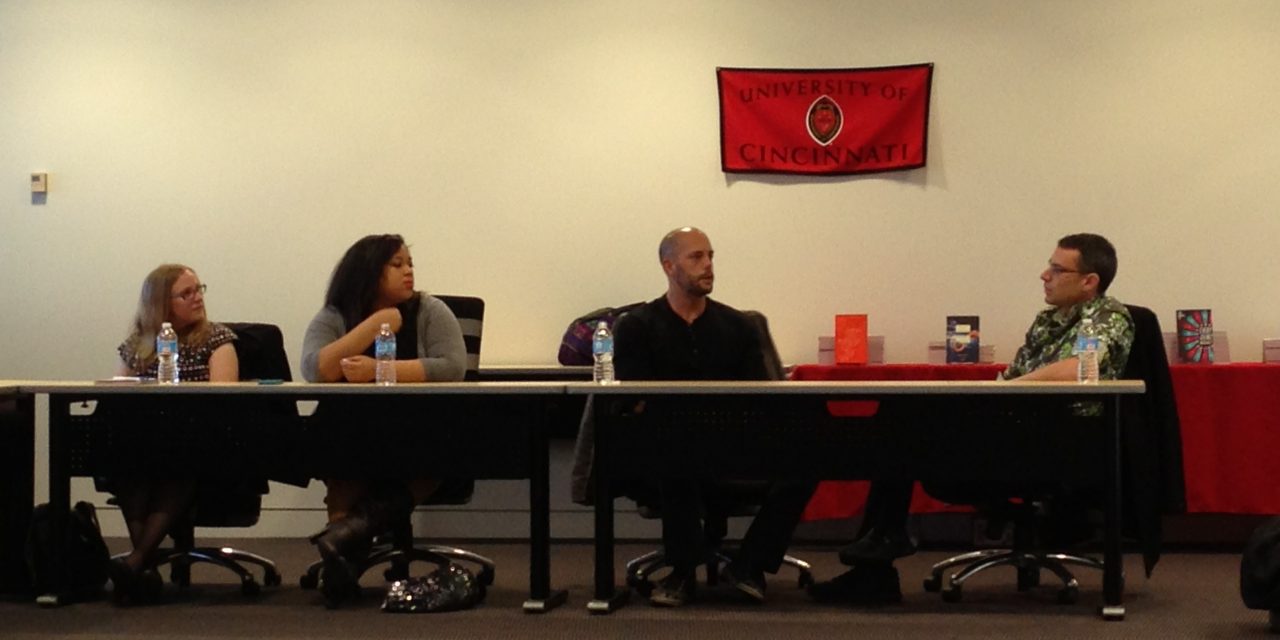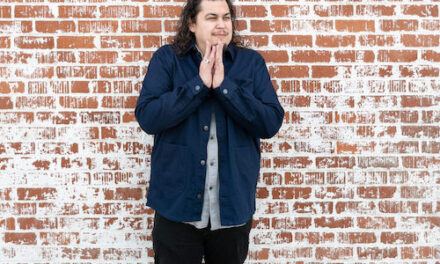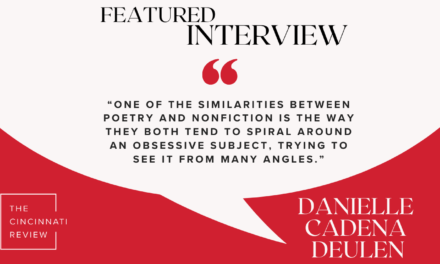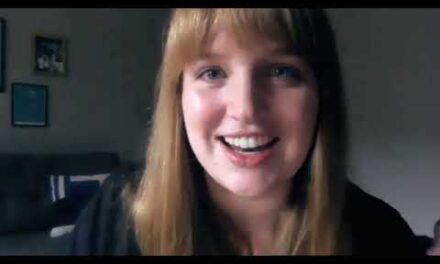 This month, UC’s English Department hosted its Emerging Writers Festival, bringing to campus four fiction writers who are emerging from their rough-spun cocoons into full-fledged writerly beings. (Okay, maybe all of them already have awards and critically acclaimed books.) During their time at UC, they took part in readings, discussions, and discussions about reading, and this week we’re delighted to bring you some excerpts from a panel discussion dubbed “The Writer as Reader,” moderated by Professor Jim Schiff. Read about how W. G. Sebald broke Ben Loory’s heart and how Ron Currie Jr. is actually not afraid of the internet. Stay tuned for Part II, coming later this week.
This month, UC’s English Department hosted its Emerging Writers Festival, bringing to campus four fiction writers who are emerging from their rough-spun cocoons into full-fledged writerly beings. (Okay, maybe all of them already have awards and critically acclaimed books.) During their time at UC, they took part in readings, discussions, and discussions about reading, and this week we’re delighted to bring you some excerpts from a panel discussion dubbed “The Writer as Reader,” moderated by Professor Jim Schiff. Read about how W. G. Sebald broke Ben Loory’s heart and how Ron Currie Jr. is actually not afraid of the internet. Stay tuned for Part II, coming later this week.
Jim Schiff: Name a book you love, and tell us why.
 Ben Loory: Probably my favorite book is Austerlitz by W. G. Sebald. He was this German writer, this super, hyperintelligent, overeducated guy. All of his books were just him going to some foreign country, stumbling around in some depressed fog, taking pictures of buildings and thinking about all the horrible things that have happened there. And also the good things and the literature and art that came out of it. I just loved it. When he was writing, it was this brand new thing I’d never seen before. And then he died in a car accident. And that was the last time I read contemporary literature. I just couldn’t handle that I had found this writer and then he died. I just completely checked out. Now I only read people who are already dead or who have written enough books for me. But there’s something in his writing in which the entire world is a haunted house. All the books are these ruins of what happened and a forerunner of what’s coming.
Ben Loory: Probably my favorite book is Austerlitz by W. G. Sebald. He was this German writer, this super, hyperintelligent, overeducated guy. All of his books were just him going to some foreign country, stumbling around in some depressed fog, taking pictures of buildings and thinking about all the horrible things that have happened there. And also the good things and the literature and art that came out of it. I just loved it. When he was writing, it was this brand new thing I’d never seen before. And then he died in a car accident. And that was the last time I read contemporary literature. I just couldn’t handle that I had found this writer and then he died. I just completely checked out. Now I only read people who are already dead or who have written enough books for me. But there’s something in his writing in which the entire world is a haunted house. All the books are these ruins of what happened and a forerunner of what’s coming.
Caitlin Horrocks: For me, it’s Cloud Atlas by David Mitchell. I was able to read it as escapism and enjoy it as a reader. It’s a book that’s fearless about what a book can do and what he’s capable as an author of pulling off. It’s a magic trick. You think, “You can’t pull this off,” and you’re waiting for him to fall off, and I don’t think he does.
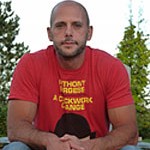 Ron Currie Jr.: Infinite Jest by David Foster Wallace. I’m reluctant to say it’s my favorite book, but it’s certainly the heavy-weight champion in terms of scope and ambition. It appreciates the importance of and demonstrates the possibility of being bound by nothing in fiction. I don’t really see the point of writing fiction if you’re not willing to hang your ass out in the breeze and just get as crazy as you possibly can without going over the edge. A lot of people think Wallace went way over the edge with Infinite Jest, but for me, it’s an absolute master class in the possibilities of fiction. [. . .] That’s what I was after as a kid. How far can we go with this; how fantastical can it be?
Ron Currie Jr.: Infinite Jest by David Foster Wallace. I’m reluctant to say it’s my favorite book, but it’s certainly the heavy-weight champion in terms of scope and ambition. It appreciates the importance of and demonstrates the possibility of being bound by nothing in fiction. I don’t really see the point of writing fiction if you’re not willing to hang your ass out in the breeze and just get as crazy as you possibly can without going over the edge. A lot of people think Wallace went way over the edge with Infinite Jest, but for me, it’s an absolute master class in the possibilities of fiction. [. . .] That’s what I was after as a kid. How far can we go with this; how fantastical can it be?
Schiff: In your view, what’s the contemporary literary landscape? Are people doing different things than they were doing ten, twenty, fifty years ago?
 Horrocks: A contemporary writer who is a sort of representation for things right now is Karen Russell. She does such a great job in picking zombies or picking vampires or taking these playful things and integrating them into such beautiful stories, doing something that is both realist in some ways and magical in others. You can see that in the aesthetic of places like One Story. There is this hunger for things that are not magical realism in a Marquez sense, but a contemporary formulation that is still evolving. Also, Roxane Gay for both fiction and nonfiction. She somehow writes and processes at internet speed, which I can’t. She does so much online writing with quick turn-around and responds to things happening right now, but there is that depth of thought and that humanity and a gracefulness that comes through in a lot of what she’s doing.
Horrocks: A contemporary writer who is a sort of representation for things right now is Karen Russell. She does such a great job in picking zombies or picking vampires or taking these playful things and integrating them into such beautiful stories, doing something that is both realist in some ways and magical in others. You can see that in the aesthetic of places like One Story. There is this hunger for things that are not magical realism in a Marquez sense, but a contemporary formulation that is still evolving. Also, Roxane Gay for both fiction and nonfiction. She somehow writes and processes at internet speed, which I can’t. She does so much online writing with quick turn-around and responds to things happening right now, but there is that depth of thought and that humanity and a gracefulness that comes through in a lot of what she’s doing.
Audience Member: How does the business of life affect your fiction?
Currie: Everything I write, including the book coming out in February, is very episodic, even when it’s published under the guise of a novel. That may be the result of the din of modern life. Maybe I don’t have the attention span, or maybe I can’t write a coherent narrative. I have no doubt that the staccato pace of information intake is affecting how I write. I sort of hope that it’s because that’s the direction we’re heading. It’s only going to get more compact and shrunk. I think the kind of book Franzen writes is a dying breed. I’m fascinated by possibilities of technology. I’m fascinated by that New Yorker story that Jennifer Egan did on Twitter. She wrote the story for the medium. It worked really well. I tried to imagine it being a longer narrative in that form, and I couldn’t do it.
Lorry: You go to a bookstore, and lots of books are similar, and I think that’s a result of writers all talking to one another. No one is developing in isolation, on their own.
Horrocks: But I think there is still a hunger for big books from readers. People want to sit and be immersed in a world. With the internet, people are always like, “This will usher in a renaissance for flash fiction or the short form because people only have a little bits of time.” But that’s not true. Even short forms require really close attention. Short forms take a lot of work for the reader. This is a weird moment when writers can think of being driven to short pieces, but for readers, as pressed for time as they are, there is still a hunger for that unbroken dream.
__________________________________________________________________________________________________________
Ron Currie Jr. has had stories in Cincinnati Review issues 7.2 and 2.2—the latter story, “False Idols,” appeared in his collection God is Dead (Penguin, 2007). He is also the author of the novels Everything Matters (Viking, 2009) and the forthcoming Flimsy Little Plastic Miracles (Viking, 2013). Currie has also received the New York Public Library Young Lions Fiction Award and the Willard L. Metcalf Award for Literature from the American Academy of Arts and Letters.
Caitlin Horrocks’s story “Embodied” appeared in issue 3.1 of Cincinnati Review; it was her first published story and later appeared in her collection This Is Not Your City (Sarabande, 2011). Her stories have also appeared in the New Yorker, Best American Short Stories 2011, the PEN/O. Henry Prize Stories 2009, Pushcart Prize XXXV, and elsewhere, and she’s won awards including the Plimpton Prize and a Bread Loaf Writers’ Conference Fellowship.
Ben Loory’s fables and tales have appeared in the New Yorker, Gargoyle, and Antioch Review, as well as on NPR’s “This American Life,” and live at Selected Shorts. His book, Stories for Nighttime and Some for the Day (Penguin, 2011), was a selection of the Barnes & Noble Discover Great New Writers program and the Starbucks Coffee Bookish Reading Club.

